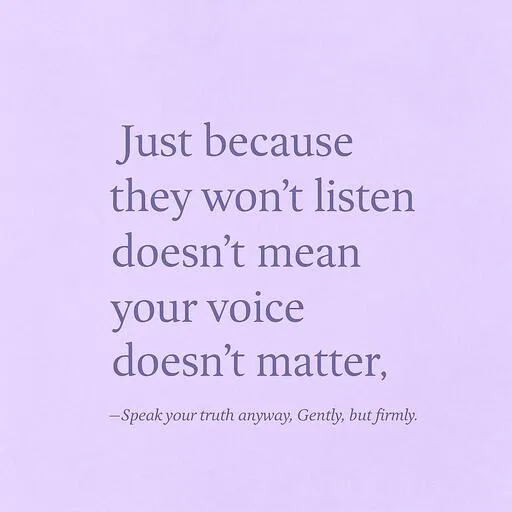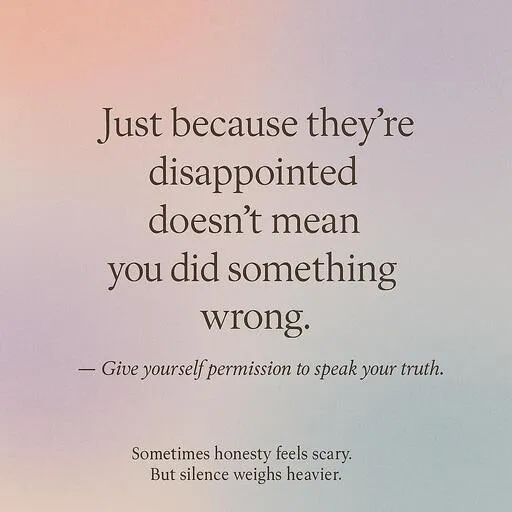Studies showed that participants felt less heard when they were in a subordinate position and when they felt their interaction partner was dominating the conversation
Research has found that men are more likely than women to make intrusive interruptions that silence other speakers, and women are more likely to be the targets of these interruptions
Being constantly cut off or talked over can make you question if your voice matters. Research shows people feel less heard when others dominate conversations. Learn practical strategies to assert yourself, demand respect, and create space for your truth to be heard.
When Your Voice Gets Lost: The Painful Reality of Being Silenced
Why People Won't Let You Explain: Understanding the Psychology
They're Operating from Defense Mode
They Want to Control the Narrative
They're Overwhelmed by Strong Emotions
The Hidden Cost of Being Silenced: Why Your Voice Matters
Immediate Strategies: How to Get Your Voice Heard Right Now
Use the Broken Record Technique
Set Clear Verbal Boundaries
Use Physical Positioning to Your Advantage
When They Still Won't Listen: Advanced Tactics That Work
Write It Down Instead
Schedule a Formal Conversation
Bring in a Neutral Third Party
Knowing When to Walk Away: Protecting Your Emotional Energy
Building Long-Term Communication Skills: Prevention Strategies
Address the Pattern, Not Just the Incident
Teach People How to Listen to You
Build Your Confidence in Other Relationships
Remember Your Worth: Your Truth Matters Even When They Won't Hear It
Use the broken record technique: calmly repeat 'Please let me finish' or 'I'd like to complete my thought' every time they interrupt. Don't get drawn into defending your right to speak—just keep stating it. If they continue interrupting, you can say 'I can see you're not ready to hear what I have to say right now. Let's try this conversation again when we can both listen to each other.' Sometimes walking away temporarily is more effective than staying in a conversation where you're being silenced.
Look at their body language and overall behavior patterns. Someone who's emotionally overwhelmed might avoid eye contact, seem agitated, or appear genuinely distressed. Someone deliberately shutting you out often shows dismissive behaviors like eye-rolling, sarcastic responses, or bringing up unrelated issues to deflect. Pay attention to whether this happens consistently across different topics and moods, or only when they might be held accountable for something. Deliberate silencing often includes power plays like talking louder, changing subjects, or making you feel guilty for wanting to be heard.
It depends on the relationship and the situation. In important relationships (family, close friends, romantic partners), it's usually worth making several attempts using different strategies—written communication, structured conversations, or involving a neutral third party. However, if someone consistently refuses to hear you despite multiple approaches, continuing to fight for their attention can actually damage your self-esteem. Sometimes the healthiest choice is to find validation and understanding elsewhere while limiting your emotional investment in that particular person's opinion.
Take slow, deep breaths and remind yourself that their inability to listen says more about them than about you. Ground yourself by feeling your feet on the floor and relaxing your shoulders. Use phrases like 'I understand you have strong feelings about this, and I do too, which is why I need us to both be heard.' If you feel yourself getting too emotional, it's okay to say 'I need a few minutes to collect my thoughts' and step away briefly. Remember: staying calm gives you more power than escalating does.
Workplace dynamics require more careful navigation. Try scheduling a formal meeting specifically to discuss your perspective: 'I have some thoughts about the situation that I think would be valuable for you to hear. Could we schedule 15 minutes to discuss this?' Use written communication when possible—emails create a record and force them to read your complete thoughts. If direct approaches don't work, consider involving HR or a higher-level manager, but be prepared with documentation of your attempts to communicate. Sometimes you may need to accept that certain authority figures won't listen and focus on doing your best work while looking for better opportunities.





